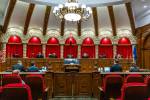Despite ‘no’ votes, Faraday deal looks inevitable
The Nevada Legislature today begins a special session to consider a package of tax breaks designed to induce electric car maker Faraday Future to build its assembly plant in North Las Vegas.
Much like the last special session — held in September 2014 — the Legislature is expected to act swiftly and ratify a deal already worked out by North Las Vegas, the governor's economic development office and Faraday.
But this is the Nevada Legislature we're talking about, so nothing is simple or entirely smooth.
Although the actual bills that will carry the deal into execution have yet to be introduced, some lawmakers already are just saying no. Freshman Assemblywoman Shelly Shelton, R-Las Vegas, was first out of the gate, saying "when the 'investment' in Faraday comes before us, the Legislature will likely fold like a cheap suit to the whims of the governor and will, once again, violate the Constitution, their oaths and the will of Nevadans by adding yet another welfare company to the state rolls."
Gosh, the Legislature is sure going to miss Shelton after the 2016 elections!
For now, however, Shelton is wrong about most of what she says: The tax incentives will cost the state $217 million over 15 years, but are expected to produce $760 million in state, local and school revenues over the next 20 years. The deal in no way violates the constitution or lawmakers' oaths. And at least those Nevadans who will nab one of the 4,500 jobs that pay an average wage of $22 per hour will support the idea.
Politically speaking, it's unwise for a lawmaker from Southern Nevada to reject the biggest economic development project the region has ever seen, one that could spark even more development down the road. Shelton's base may relate to her principled opposition, but everybody else will only remember that when Shelton was given the chance to help the southern end of the state, she committed region treason.
But let's talk about that conservative base for a second. For them, the very idea of subsidizing companies worth millions or billions with taxpayer dollars is wrong. They'll argue businesses that have already made Nevada home, some of which weathered the recession here, deserve help more than predatory newcomers. And the specter of approving millions in tax breaks on the heels of approving a huge tax on Nevada residents and businesses earlier in the year is not a pretty one.
All of those things are legitimate points to debate.
But aside from the obvious — this deal will bring jobs and dollars to Nevada that otherwise would never have been seen in the state, and the return on investment obviously tilts in the state's favor — there's a more salient point: inevitability. Nevada long ago decided it was going to be a player in the game of economic development. It long ago decided that competing with other states (playing with taxpayer dollars) was a legitimate effort for state government. In fact, Nevada has done pretty well in those competitions, winning Tesla and now Faraday.
Once that decision is made, the only questions that remain are what incentives the state can afford and what benefits it will get in return. Whether incentives are a good idea, whether they are an appropriate use of state resources, has already been decided. And while Shelton and her fellow conservatives may still try to argue those points, those arguments will not affect the course or outcome of the Faraday debate.
Whether or not the Faraday deal, or the Tesla deal, are really worth it for Nevada is a question that will only be fully answered with the remove of history. But the inevitability of that deal is a settled matter.
— Steve Sebelius is a Las Vegas Review-Journal political columnist and co-host of the show "PoliticsNOW," airing at 5:30 p.m. Sundays on 8NewsNow.
Follow him on Twitter (@SteveSebelius) or reach him at 702-387-5276 or ssebelius@reviewjournal.com.























